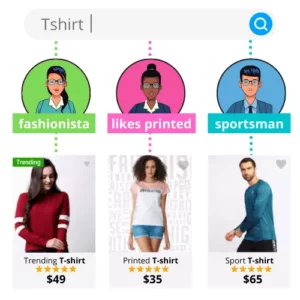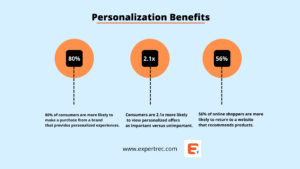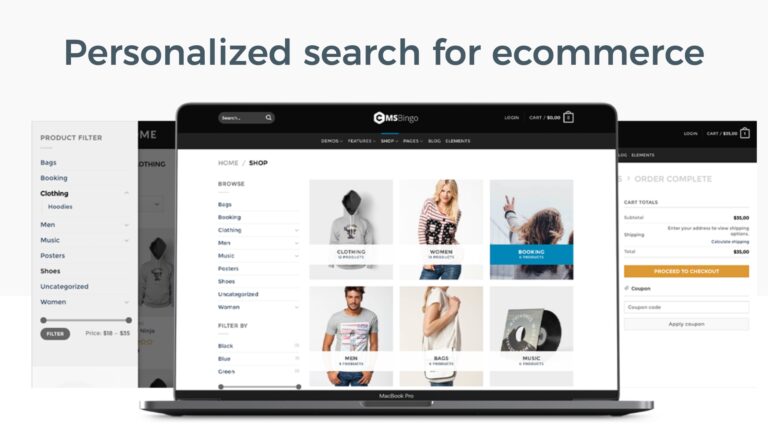Have you noticed that you are being exposed to your favorite shopping items from an online store or business listings related to your search? This phenomenon is called audience-targeted personalized search. Search anything on an e-commerce website -, from videos, images, blogs, and products – you’ll get personalized search results based on your location and preferences.“Anytime you surf the internet using search buttons on any online retail store,, you are sharing your details of language, location, IP address, device, and search history. These details provide customized results. The user-centric search results phenomenon is extremely beneficial for e-commerce businesses. With the personalized search option for e-commerce businesses on their websites, the stores can surface their content among the customized search experiences, gaining a competitive edge.
- Why is personalization important?
- Quick tips to optimize for personalized search results
- What are the benefits of personalized searches?
Let’s begin with the first part of the post.
Why is personalization important?
Google is capable of tailoring search results to individual users based on parameters, such as location, language, or web history. Prior search results have a pivotal role in the scope of personalization.
What if you have the same search results capabilities on your website? However, it depends on you on how to use the data.

Taking e-commerce companies as an example, let’s explore the importance of the personalized search for e-commerce companies.
If e-commerce stores use the search data and insights to create personalized content for distinct audience groups, then the website shows the relevant search results.
With personalized search queries on their website, the e-commerce stores can provide better results to their users. When they provide exactly what the user searches, the conversion rates go high.
- How is it important for achieving marketing objectives?
In a digital marketing strategy, the basic objective of brands is to boost engagement or sales. This objective narrows down more by aiming the content ranked higher by Google for particular keywords.
Brands like Amazon create dynamic sections on each page that vary based on country, language, search intent, products, etc.
Shout out to e-commerce stores
Please AVOID using duplicate content, poor UX, complicated URLs to prevent poor performance of your search results.
Now that we know how personalized search for e-commerce companies impacts content ranking, let’s look at a few tips to make your life easy and search results fun.
Quick tips to optimize for personalized search results
91% of consumers are “more likely to shop with brands that recognize, remember, and provide them with relevant offers and recommendations,” says Accenture.
The fact proves that you get to see the positive impact of personalization on your sales. So the e-commerce companies who are doing their job right for personalization are taking these steps:
- Location settings – Take care of the location in your search results engine. Needless to say, put your location’s name or the location that you want to target on your website for your users via search results.
- Long-tail keywords – Usage of long-tail keywords helps to tap user search intent. These keywords bring sales conversions, and you can see that difference in your ROI. Use keywords in your search bar, such as, “Floral print dress for women”, “winter jackets for men”, etc.
- Mobile optimization – In this era where everything is being looked for on Google, if you do not optimize your website’s search bar, then you stand nowhere. A website that meets the user’s expectations on mobile has a chance of getting viewed. If it doesn’t, then all your work on the website goes in vain.
What are the benefits of personalized searches?
The users get search results based on their preferences and choices. The more you provide them with results that are relevant to them, the demand for more similar content is created. Hence by creating a custom search, you not only have a good chance of viewership but the conversions on your website can also be maximized.

Say, for example, you are a garment store chain, and you provide all kinds of clothing. If someone searches “yellow hoodies for men” on your website, then your website should show only yellow-colored hoodies based on their search query on the search bar.
If you (hypothetically, of course) operate a large garment cum e-commerce chain throughout London, you can take these steps to reach extensively to users specific to your location.
The example indicates that if you do not follow the protocols that Google uses to customize search results, you may not appear in the search results for your audience.
Wrapping up… Use audience targeting for high-value customers
With Expertrec, your website is searched easily with target optimization. Audience targeting is beneficial for e-commerce sites when they are running special offers for their regular customers or new ones during email signup. You can target users with a Personalized search for your e-commerce site with a particular niche or home page to increase conversions.
So, it does not only limit personalization, but the idea is also to what extent your website’s search is personalized. That totally depends on how companies cleverly optimize and use the search data to their benefit.
Personalization is a very great opportunity for outsmarting the competition by adding various search queries onto your website’s search results and providing relevant results/products to your consumers.
The best way to digitally market your products and reach the audience is to create content that reflects their searches, choices, location, and relevance. This strategy can make you achieve your marketing goals and convert more viewers into customers.
EXPERTREC makes a search on your site very easy by accepting typos, quick results, and even voice search! With the customized search option, you can redefine the search experience for your users.
This might need a very good and in-depth research of the current market trends and the viewers’ choices. Need help? Get in touch with us!




